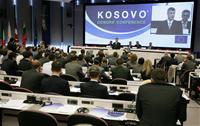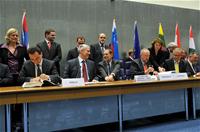Who remembers Kosovo?
Adelina Marini, February 18, 2010
 Only 2 and a half years ago Kosovo was on the first pages of newspapers, was in the headlines and the most commented stories, mainly because of the fear that when it claimed independence this could unleash a new wave of long and bloody Balkan wars. This did not happen. For 2 years now the former Serbian province is independent but this is not a reason for celebrations, as it seems. The most astonishing thing is that Bulgaria, which was among the first countries to recognize the new state, was silent all day long and does not spread even a line of declaration supporting, for example the developments in Kosovo or criticising the slow progress or, at least, just a greetings card, marking a 2-year long existence without any troubles.
Only 2 and a half years ago Kosovo was on the first pages of newspapers, was in the headlines and the most commented stories, mainly because of the fear that when it claimed independence this could unleash a new wave of long and bloody Balkan wars. This did not happen. For 2 years now the former Serbian province is independent but this is not a reason for celebrations, as it seems. The most astonishing thing is that Bulgaria, which was among the first countries to recognize the new state, was silent all day long and does not spread even a line of declaration supporting, for example the developments in Kosovo or criticising the slow progress or, at least, just a greetings card, marking a 2-year long existence without any troubles.
Instead, the European Parliament's rapporteur and foreign policy spokesperson for the Greens/European Free Alliance Ulrike Lunacek said two years later it was time to focus all efforts to ensure the future of this county. "All citizens of Kosovo - including the Serbian and other minorities - deserve assurances that their state finally can provide them with economic prosperity and the supply of basic services as education and health", Lunacek added.
The Greens and the European Free Alliance also called on Pristina, Belgrade and Brussels to cooperate economically and politically to avoid a deterioration of the situation for the population in Kosovo. They also noted that the High Representative for the foreign affairs Catherine Ashton who is in the region, to make clear statements that would make it crystal clear to Belgrade that Serbia's accession to the EU will not be possible without recognising Kosovo. Ashton should also personally involve with ensuring that the rest 5 EU member states would recognize the new Balkan state.
Serbia started its political dialogue with the European Union began in the end of January this  year and the Spanish Presidency of the Union outlined Kosovo and Western Balkans as one of its major priorities. According to the Spanish Presidency 2010 will be a key year for the future of the region. But we could hardly understand this is a key priority, given the lack of ant reactions on behalf of the EU and the member states to the second anniversary of Kosovo's independence. But the history of the region shows that the ostensible silence is usually not a signal of calm.
year and the Spanish Presidency of the Union outlined Kosovo and Western Balkans as one of its major priorities. According to the Spanish Presidency 2010 will be a key year for the future of the region. But we could hardly understand this is a key priority, given the lack of ant reactions on behalf of the EU and the member states to the second anniversary of Kosovo's independence. But the history of the region shows that the ostensible silence is usually not a signal of calm.
 Bakir Izetbegovic, Andrej Plenkovic | © Council of the EU
Bakir Izetbegovic, Andrej Plenkovic | © Council of the EU Aleksandar Vucic, Recep Tayyip Erdogan | © Serbian Presidency
Aleksandar Vucic, Recep Tayyip Erdogan | © Serbian Presidency Jean-Claude Juncker, Zoran Zaev | © European Commission
Jean-Claude Juncker, Zoran Zaev | © European Commission